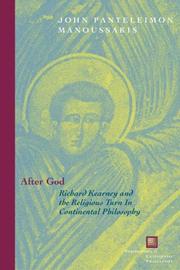| Listing 11 - 17 of 17 | << page >> |
Sort by
|
Book

ISBN: 9780823252107 Year: 2013 Publisher: New York, NY
Abstract | Keywords | Export | Availability | Bookmark
 Loading...
Loading...Choose an application
- Reference Manager
- EndNote
- RefWorks (Direct export to RefWorks)
Digital

ISBN: 9780823252107 9780823251926 Year: 2013 Publisher: New York, N.Y. Fordham University Press
Abstract | Keywords | Export | Availability | Bookmark
 Loading...
Loading...Choose an application
- Reference Manager
- EndNote
- RefWorks (Direct export to RefWorks)
Book

ISBN: 9780823292332 0823292339 Year: 2022 Publisher: New York, NY
Abstract | Keywords | Export | Availability | Bookmark
 Loading...
Loading...Choose an application
- Reference Manager
- EndNote
- RefWorks (Direct export to RefWorks)
What is strange? Or better, who is strange? When do we encounter the strange? We encounter strangers when we are not at home: when we are in a foreign land or a foreign part of our own land. From Freud to Lacan to Kristeva to Heidegger, the feeling of strangeness—das Unheimlichkeit—has marked our encounter with the other, even the other within our self. Most philosophical attempts to understand the role of the Stranger, human or transcendent, have been limited to standard epistemological problems of other minds, metaphysical substances, body/soul dualism and related issues of consciousness and cognition. This volume endeavors to take the question of hosting the stranger to the deeper level of embodied imagination and the senses (in the Greek sense of aisthesis). This volume plays host to a number of encounters with the strange. It asks such questions as: How does the embodied imagination relate to the Stranger in terms of hospitality or hostility (given the common root of hostis as both host and enemy)? How do we distinguish between projections of fear or fascination, leading to either violence or welcome? How do humans “sense” the dimension of the strange and alien in different religions, arts, and cultures? How do the five physical senses relate to the spiritual senses, especially the famous “sixth” sense, as portals to an encounter with the Other? Is there a carnal perception of alterity, which would operate at an affective, prereflective, preconscious level? What exactly do “embodied imaginaries” of hospitality and hostility entail, and how do they operate in language, psychology, and social interrelations (including racism, xenophobia, and scapegoating)? And what, finally, are the topical implications of these questions for an ethics and practice of tolerance and peace?


ISBN: 9780823290819 9780823225323 Year: 2022 Publisher: New York, N.Y. Fordham University Press
Abstract | Keywords | Export | Availability | Bookmark
 Loading...
Loading...Choose an application
- Reference Manager
- EndNote
- RefWorks (Direct export to RefWorks)
Digital

ISBN: 9780823292332 9780823234622 Year: 2022 Publisher: New York, N.Y. Fordham University Press
Abstract | Keywords | Export | Availability | Bookmark
 Loading...
Loading...Choose an application
- Reference Manager
- EndNote
- RefWorks (Direct export to RefWorks)
Book

ISBN: 9780823252343 Year: 2013 Publisher: New York, NY
Abstract | Keywords | Export | Availability | Bookmark
 Loading...
Loading...Choose an application
- Reference Manager
- EndNote
- RefWorks (Direct export to RefWorks)
Multi

ISBN: 9780823252343 9780823251445 9780823251452 Year: 2013 Publisher: New York, N.Y. Fordham University Press
Abstract | Keywords | Export | Availability | Bookmark
 Loading...
Loading...Choose an application
- Reference Manager
- EndNote
- RefWorks (Direct export to RefWorks)
"Can Orthodox Christianity offer spiritual resources uniquely suited to the environmental concerns of today? This book makes the case emphatically that it can indeed. In addition to being the first substantial and comprehensive collection of essays, in any language, to address environmental issues from the Orthodox point of view, this volume (with contributions from many of the most influential theologians and philosophers in contemporary world Orthodoxy) will engage a wide audience, in academic as well as popular circles--resonating not only with Orthodox audiences but with all those in search of a fresh approach to environmental theory and ethics that can bring to bear the resources of ancient spirituality, often virtually unknown in the West, on modern challenges and dilemmas"-- "Can Orthodox Christianity offer unique spiritual resources especially suited to the environmental concerns of today? This book makes the case that yes, it can. In addition to being the first substantial and comprehensive collection of essays, in any language, to address environmental issues from the Orthodox point of view, this volume with contributions from the most highly influential theologians and philosophers in contemporary world Orthodoxy will engage a wide audience, in academic as well as popular circles--resonating not only with Orthodox audiences but with all those in search of a fresh approach to environmental theory and ethics that can bring the resources of ancient spirituality to bear on modern challenges"--
Biology --- Creation --- Ecology --- Human ecology --- Nature --- Religious aspects --- Orthodox Eastern Church --- Doctrines.
| Listing 11 - 17 of 17 | << page >> |
Sort by
|

 Search
Search Feedback
Feedback About UniCat
About UniCat  Help
Help News
News